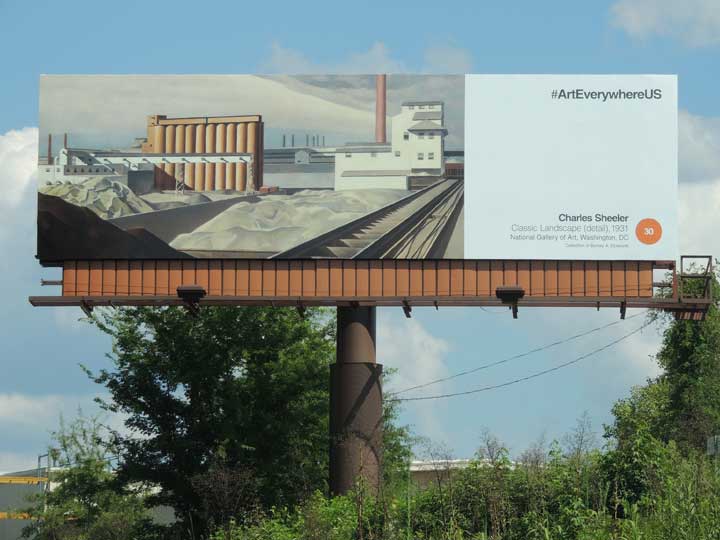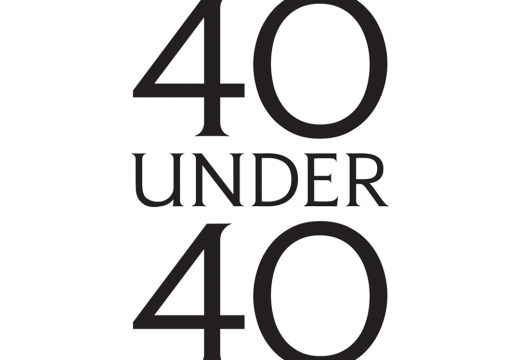Want to know what the best outdoor art experience is in New York this month? It’s not the Jeff Koons floral extravaganza at Rockefeller Center but walking down 7th Avenue from 54th Street to Times Square, about 10 blocks away. The avenue begins to slope downhill at 54th so the blazing billboards of Times Square, which is about three blocks long, are all in full view. Even from 54th you can see clearly that one giant billboard jutting out from the right is flashing digital reproductions of American pictures. Appropriately, the first picture I spotted on Monday 4 August, the centenary of the declaration of the First World War, was Child Hassam’s Allies Day, May 1917 which depicts a New York street filled with triumphant US flags. It was a good coincidence.
As I walked, the board morphed to Gilbert Stuart’s George Washington looking quizzically up the street from Times Square’s chaos of yellow cabs; then to Edward Hicks’s The Peaceable Kingdom, bucolic amid the concrete; then to Grant Wood’s American Gothic couple staring out silently and disapprovingly at the chattering crowds in their shorts and shades. Nearer to Times Square I saw more art billboards, flashing Rothko’s White Center, Lichtenstein’s Look Mickey, Homer’s The Water Fan and, closer to home, Cindy Sherman’s self-portrait set in nearby Central Park. In total, more than a dozen billboards are flashing up 58 art works in rotation, each holding their own among high-cost competitive digital advertising for Toshiba, Dunkin’ Donuts, Coca Cola, Google play. The square’s mid-road grandstand is ideal for sitting to enjoy it all.
More from Apollo… Art and Advertising: friends or foes?
Similar experiences are on offer across the US. It’s all part of Art Everywhere US, a coast to coast festival of pictures (mostly paintings, a few photographs) with the fitting subtitle ‘A Very Very Big Art Show’. About 50,000 digital and static displays in 50 states enliven billboards and buses, shopping malls and highways, and come in all forms such as dioramas in airports and videos in health clubs.

Art Everywhere US rendering featuring (left) Childe Hassam’s ‘Allies Day, May 1917’ (1917, National Gallery of Art) and (right) Grant Wood’s ‘American Gothic’ (1930, Art Institute of Chicago © Estate of Grant Wood / VAGA, NY, NY)
Art Everywhere was launched in the UK last year as the brainchild of Richard Reed who spotted a painting cheering up London’s Goldhawk Road and thought ‘That gives me a sparkle. What if there could be beautiful art on every street?’
This year, the US stages its inaugural version. Team work led by the Outdoor Advertising Association of America (OAAA), which controls 90% of the US pubic space advertising, was challenging. The easy bit was asking five museums to offer the public a shortlist of popular pictures to choose from, and then clearing copyright; the museums are the National Gallery of Art, Art Institute of Chicago, Dallas Museum of Art, Los Angeles County Museum of Art and the Whitney Museum of American Art.
The next bit was not easy: the pictures needed to be in top quality high resolution which required the skills of digital agencies; the billboard spaces needed to be donated; and the images needed to reach as many people as possible through Twitter, Facebook, Instagram and Pinterest. Some 60 agencies and companies took part. Clear Channel Outdoor gave space, Vector Media put up rotating digital images on buses, Blipper mobile visual discovery platform made 39 of the artworks interactive. Ayuda made the map so that, for instance, when you find that Frederic Church’s The Icebergs (1861) is near your home on Boulder Way in Las Vegas, you can learn about the picture and where it hangs, enjoy the street view image and get directions to drive on over to see the billboard which might cool you down in Nevada’s boiling hot August.
What comes next? Reed is hoping for China, India, the world. When it comes to ‘giving sparkle’ there are no boundaries.
Art Everywhere US runs until 31 August.
Related Articles
Art Everywhere: which works will fare best on the billboards?
Advert Averse: Anger as Morrisons turns the Angel of the North into a billboard
















![Masterpiece [Re]discovery 2022. Photo: Ben Fisher Photography, courtesy of Masterpiece London](http://zephr.apollo-magazine.com/wp-content/uploads/2022/07/MPL2022_4263.jpg)
‘Like landscape, his objects seem to breathe’: Gordon Baldwin (1932–2025)